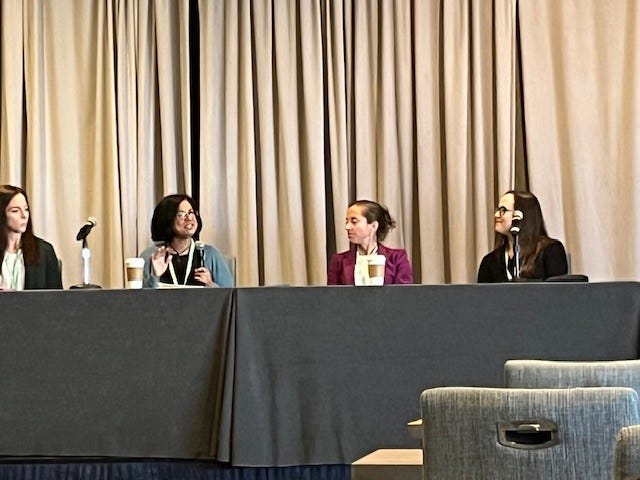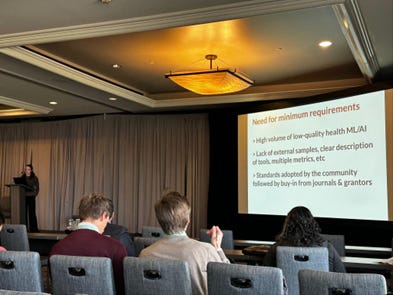ICHPS 2025 Offers Opportunity for Professional Growth and Innovative Thinking to Improve Health Equity
Beth Ann Griffin (RAND), Lane Burgette (RAND), Staci Hepler (Wake Forest University), Sarah Lotspeich (Wake Forest University), and Mousumi Banerjee (University of Michigan)
The International Conference on Health Policy Statistics was held January 6–8 in San Diego California. ICHPS brings together practitioners, methodologists, health service researchers, health economists, and policy analysts to exchange and build on ideas they will disseminate to the broader health policy community. In addition to US and Canadian participants, ICHPS co-chairs Lane Burgette and Beth Ann Griffin welcomed attendees from Israel, Europe, and China.

The meeting kicked off with a warm welcome from Madhumita (Bonnie) Ghosh Dastidar, recent president of ASA and Senior Statistician at RAND. This was followed by the opening keynote from Whitney Robinson from Duke University School of Medicine. Robinson discussed the big mistakes we researchers can make in causal inference, with solutions including thinking about the nature of the problem incorrectly and letting the data drive the research. She argued that recognizing these patterns and emulating creative, interdisciplinary work offers opportunities to innovate and sharpen our work. Serving as the discussant, Susan Paddock—Executive Vice-President and Chief Scientist at NORC—encouraged attendees to continue engaging in efforts to ensure our data are measured correctly and address well-specified problems using high-quality research paradigms.
The closing keynote was delivered by Sherri Rose from Stanford University. She discussed the latest issues surrounding ethical use of AI, highlighting that algorithms are not neutral. She explained that optimization choices reflect a specific value system and the distribution of power to make these; she also described how data also reflect societal bias. Serving as discussant, Elizabeth Stuart – Chair of Biostatistics at Johns Hopkins University, Bloomberg School of Public Health – reflected on how our role as methodologists is changing and we need to find ways to ensure that people understand the value statisticians bring to research.
Between the keynotes was a “meet the editor” session that brought together editors from top medical and applied statistics journals to share their experiences, discuss the characteristics of successful submissions, and define what researchers should take care to do (and not to do) as they seek to disseminate their work in both high-impact applied and methods journals. The editors included Elizabeth Stuart from JAMA Health Forum, Layla Parast from Medical Care, Nandita Mitra from Observational Studies, and Beth Ann Griffin from Annals of Applied Statistics.

ICHPS also included a special townhall session, titled “Health Policy and Health Equity for Local Populations”. This session highlighted talks by two speakers from UCSD who are performing research at the intersection of health policy and health equity for residents in and around the San Diego community. Elena Martinez, a Professor in the department of family medicine and public health, highlighted findings and insights from a recent pragmatic randomized trial to increase colorectal cancer screening among low‐income and minoritized populations in San Diego County (https://ww3.aievolution.com/AMSTATevents/Events/viewEv?ev=4331). Aladdin Shadyab, Associate Professor of Public Health and Medicine, discussed the design of a future study to assess a comprehensive healthcare intervention to reduce healthcare costs and improve health outcomes in older adults at risk of nursing home admission and homelessness.
There was an exciting line-up of invited and contributed sessions covering diverse topics centered around this year’s theme of “Statistical Innovations to Improve Health Equity.” The fifteen invited sessions focused on topics including methodological challenges like complex study and survey designs, measurement error, data, and fusion. Many important areas of real-world applications were also discussed, from the overdose epidemic to mental health to LGBTQIA+ health.
The conference featured 11 training workshops on a diverse range of topics. Topics included: heterogeneous treatment effect estimation, record linkage, Bayesian tree ensembles and nonparametrics, complex survey data, policy intervention design and evaluation, and power analysis with planned error control for multiple outcomes. Additionally, the Alan Alda Center for Communicating Science offered a workshop on effective communication.

To close out the meeting, Mousumi Banerjee, chair of the ASA Health Policy Statistics Section, presented the Mid-Career and Long-Term Excellence awards. The Mid-Career Award is presented to a recognized mid-career leader in health care policy and health services research who has made outstanding contributions through methodological or applied work and demonstrates promise of continued excellence at the frontier of statistical practice that advances the aims of the Health Policy Statistics Section. Two were honored with this award this year: Miguel Marino, professor and biostatistician at department of family medicine at Oregon Health & Science University, and José Zubizarreta, professor at department of health care policy, Harvard Medical School and department of biostatistics at Harvard School of Public Health.
The Long-Term Excellence Award is given to an individual who has made significant contributions to health care policy and health services research through mentoring and/or service that advances the aims of the Health Policy Statistics Section. This year’s award recipient was Lisa Lix a professor of biostatistics in the department of community health sciences at the University of Manitoba, Canada. Lisa is a Tier 1 Canada Research Chair in Methods for Electronic Health Data Quality, and Director of the Data Science Platform in the George & Fay Yee Centre for Healthcare Innovation at the University of Manitoba. The award recognizes her multifaceted talents and contributions, her dedication, leadership, and research acuity, but more importantly her generosity – in mentoring, collaboration, and service to further the missions of the Health Policy Statistics Section.

ICHPS also provides learning and networking opportunities for those new to health policy. In addition to honoring 5 students with travel awards, the conference provides a venue for students and developing scholars to network and engage with leading methodologists via poster sessions and a student networking event. The student “speed networking” event brought together dozens of students and mentors. Mentors were drawn from academia, government, and industry and shared their candid experiences and thoughts about career development. Students also received a reduced conference registration rate, and all workshops were free for students.
The next ICHPS conference is expected to take place in 2027 so keep your eyes out for more information soon enough!




